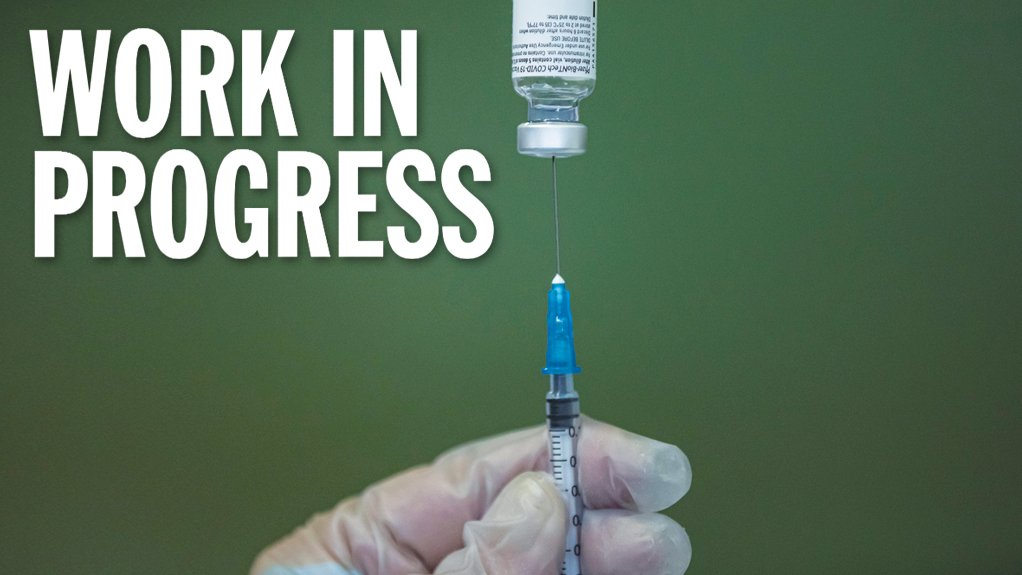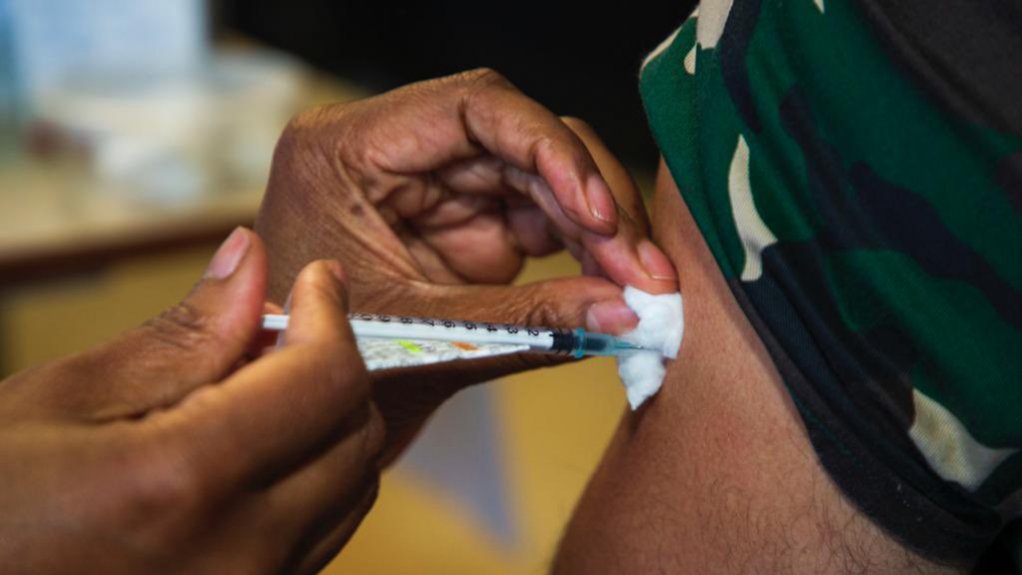Vaccine roll-out to incorporate employer sites as part of second phase



COLLABORATION While government is leading the vaccination programme, business has also mobilised in support
As South Africa begins the second phase of its national Covid-19 vaccination campaign, under which 16.6-million people will be vaccinated, government and Business for South Africa (B4SA) have indicated that business will be directly involved in helping to ramp up this exercise through, among others, the use of some of their premises as employer vaccination sites.
While government is leading the vaccination programme, business has also mobilised in support of the roll-out, which is intended to blunt the health and economic impacts of the Covid-19 pandemic.
B4SA is an alliance of volunteers that supports the national response to the pandemic and is currently focused on supporting the national vaccination programme. It has created a specific workstream responsible for vaccination across the private sector.
The three specific service-delivery streams comprise health sites – general practitioners (GPs), pharmacies, hospitals and travel clinics; mass vaccination sites; and employer sites.
Speaking during a joint B4SA/National Department of Health (NDoH) webinar, held last month, B4SA Service Delivery Platforms’ Dr Guni Goolab explained that ‘employer sites’ referred to mining sites, corporate sites, government sites, parastatal sites, and congregate settings.
Workers have the option to be vaccinated at any of the three service-delivery stream sites. While it is not compulsory for companies to vaccinate employees at the workplace – even if there is an occupational clinic – doing so would offer convenience to employees, and potentially their families and nearby communities as well.
B4SA Service Delivery Platforms’ Dr Lungi Nyathi, who is overseeing the employer site roll-out, noted that healthcare sites would form the backbone of Phase 2, adding, however, that queues at public vaccination sites would be shorter and congestion at these sites mitigated if vaccination also took place at workplaces. This would have the added advantage of accelerating and streamlining the vaccination process.
Employer Site Options
Businesses opting to vaccinate in the workplace have several options.
Firstly, a business can set up a primary workplace vaccination site – to which vaccines will be delivered and where the vaccines will be stored and administered.
A primary site has to be accredited and registered on the Master Facility List (MFL), accessible online at https://mfl.csir.co.za/. The accreditation requirements are stringent and will be detailed at a later stage.
Secondly, a business can partner with a registered primary healthcare vaccination site – GP, pharmacy, hospital, travel clinic or permanent occupational health clinic – near the business. In this model, the business serves as an outreach or secondary site, and the onus to fulfil the accreditation requirements will be on the primary site.
The primary site will receive the vaccines and the secondary workplace site will collect these from this site.
All vaccinators at the secondary site will be required to have completed the vaccinator training.
Should the workplace site want to store the vaccines it fetches, it may be linked only to a pharmacy, which will need to extend its Pharmacy Council storage licence to encompass this site.
This option is, therefore, most suited to employers that have a large workforce and a fridge or freezer, as well as enough vaccinators to administer large quantities of vaccine doses daily.
Smaller workplaces that comprise fewer employees and have an occupational health clinic can collect vaccines daily from the primary site and return any unused stock at the end of each day.
Thirdly, an employer can outsource employee vaccinations to a provider that will run a mobile service to the workplace, with vaccinators transported to and from the workplace. All mobile services will be linked to a primary registered site.
Nyathi said B4SA was also exploring options to set up vaccination sites in retail environments to create a bigger site and vaccinate employees from there.
Employers will be responsible for the costs of setting up vaccination sites, while the NDoH and medical schemes will reimburse the cost of the vaccine doses, their distribution to the business site and the cost of administering them.
Quality Control
Nyathi called on businesses to support the national roll-out by registering as primary workplace sites to vaccinate employees.
However, she stressed that there were certain NDoH criteria that these businesses would have to meet to ensure quality control, the full list of which is available on the organisation’s website.
The most pertinent of these requirements is that the vaccination site has to include a pharmacy with a registered pharmacist, be a licensed hospital or a permanent occupational health clinic with either a permanent or contracted GP or doctor, or a nurse who has the relevant permit to run such a clinic.
Nyathi indicated that, for the majority of the sites, especially in the metro districts, the Pfizer vaccine would be used. The Pfizer vaccine has a specific cold-chain requirement and has to be stored at a temperature of –20 °C.
This vaccine is rated as a Schedule 4 drug, which would normally require a prescription; therefore, all workplace vaccination sites have to be curated and receive a Section 22A(15) permit from the NDoH, as the vaccine must be handled in a specific way.
This permit enables a site to have all the vaccinators working at or associated with a primary site to administer vaccinations.
The curation and permit application is embedded in the MFL registration process, which is electronic and slated to take about one week.
Moreover, every person responsible for a site has to be verified as a provider in good standing and has to have received the requisite training.
All vaccinators – who should be qualified healthworkers – must undergo vaccinator training and receive a certificate to confirm the completion of such training.
The specifications of Pfizer vaccination packs also play a role in site requirements.
One pack contains 1 170 doses and can be stored at a temperature of –20 °C for up to two weeks. The vaccine must be thawed and applied within five days.
Therefore, B4SA recommends that a primary site be able to administer at least 200 vaccine doses daily. To achieve this, a site would require about seven vaccinators, as “this would ensure limited waste of vaccines by enabling throughput”, Nyathi said.
To meet this daily vaccination recommendation, B4SA says sites should be able to vaccinate 5000 people and perhaps aim to vaccinate double this number.
Consequently, employers that have large workforces could vaccinate employees; employees and their families; or employees and/or their families, and cater for nearby communities as well.
Further, B4SA recommends that workplace sites in rural areas consider vaccinating people other than their employees. For example, some workplaces, such as mines, could set up a primary site, from which they could supervise affiliated satellite sites.
Vaccine doses will be delivered to the primary site, which, in turn, will coordinate the administration of the doses with the satellite site to achieve increased vaccinations.
Businesses will need to nominate an MFL administrator to manage the site on the MFL and receive communication from the MFL team.
Nyathi encouraged businesses that meet these requirements to submit their site/s for consideration by filling in a workplace template, available on B4SA’s website, to help the organisation and the NDoH keep track of sites and accommodate the gaps that may be identified.
Operating an Employer Site
Employees who want to be vaccinated must register on the Electronic Vaccination Data System (EVDS) once registration is open for their category.
B4SA emphasises that employers should encourage as many of their employees as possible to register.
To enable a workplace to allocate employees to its vaccination site, an interface will be created for an employer to provide the ID numbers of the employees who are allocated to the workplace site.
B4SA recommends that an employer obtain consent from employees for the exchange of this information. The ID numbers of family members will also be required if a workplace chooses to include them on its vaccination programme.
If employees are not linked to the employee site, they will be allocated to a vaccination site that is the nearest to the employer site.
The allocation of vaccines to the workplace site will be determined by the number of people and vaccinators linked to the site, as well as the number of hours for which the site operates.
Workplace sites can make appointments to manage workplace productivity and any relevant shifts.
The employer is responsible for ensuring that employees know the times of their vaccination, as the EVDS will not make these appointments.
The vaccination site has also be registered on the stock visibility system to report on and manage its vaccination stock, so that distributors can keep track of the stock on hand and so be able to determine how much stock they should deliver. Stock will be delivered every 14 days.
Article Enquiry
Email Article
Save Article
Feedback
To advertise email advertising@creamermedia.co.za or click here
Comments
Press Office
Announcements
What's On
Subscribe to improve your user experience...
Option 1 (equivalent of R125 a month):
Receive a weekly copy of Creamer Media's Engineering News & Mining Weekly magazine
(print copy for those in South Africa and e-magazine for those outside of South Africa)
Receive daily email newsletters
Access to full search results
Access archive of magazine back copies
Access to Projects in Progress
Access to ONE Research Report of your choice in PDF format
Option 2 (equivalent of R375 a month):
All benefits from Option 1
PLUS
Access to Creamer Media's Research Channel Africa for ALL Research Reports, in PDF format, on various industrial and mining sectors
including Electricity; Water; Energy Transition; Hydrogen; Roads, Rail and Ports; Coal; Gold; Platinum; Battery Metals; etc.
Already a subscriber?
Forgotten your password?
Receive weekly copy of Creamer Media's Engineering News & Mining Weekly magazine (print copy for those in South Africa and e-magazine for those outside of South Africa)
➕
Recieve daily email newsletters
➕
Access to full search results
➕
Access archive of magazine back copies
➕
Access to Projects in Progress
➕
Access to ONE Research Report of your choice in PDF format
RESEARCH CHANNEL AFRICA
R4500 (equivalent of R375 a month)
SUBSCRIBEAll benefits from Option 1
➕
Access to Creamer Media's Research Channel Africa for ALL Research Reports on various industrial and mining sectors, in PDF format, including on:
Electricity
➕
Water
➕
Energy Transition
➕
Hydrogen
➕
Roads, Rail and Ports
➕
Coal
➕
Gold
➕
Platinum
➕
Battery Metals
➕
etc.
Receive all benefits from Option 1 or Option 2 delivered to numerous people at your company
➕
Multiple User names and Passwords for simultaneous log-ins
➕
Intranet integration access to all in your organisation




















